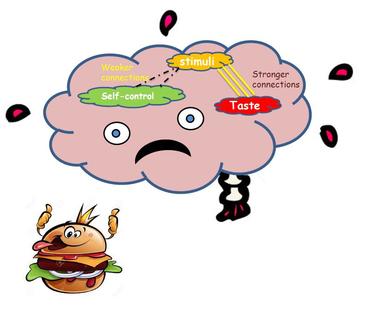|
11/16/2016
BEWARE! STRESS CAN TEMPT YOU
By Indulekha Karunakaran
STRESS - holds the dubious distinction of being a popular term in the medical domain as well as our day-to-day life. It has place in medical domain owing to its intricate connection to all leading causes of death in the world - cancer, diabetes, heart disease, suicides, liver disease; It is inseparable from us in day-to-day life, because of the pressures and demands of an urbanized and money mongering life. Not surprisingly, the question of how stress treacherously works its way through the human mind to endow us successfully with such life-threatening ailments is one among the top research conundrums investigated by scientists today. Well, Rome wasn't built in a day!! Behind every medical discovery there is painstakingly enormous amount of time, resources, collective thinking and critical analysis of the problem and yet, the probability that the enigma would be completely solved is very tiny. Research on stress is no different. So scientists go about taking up small pieces of the bigger puzzle one after another and finally try to see the bigger picture. A study by Dr. Silvia Maier and co-workers at the University of Zurich, Switzerland is one such elegant piece of work that unravels how acute stress disrupts self-control in human beings. To be more specific, Maier and colleagues were interested to study the mechanism behind, ‘self control over food choices’. Why study specifically food choices? Junk food is another partner-in-crime, which when combined with stress could be a powerful concoction to accelerate all of the killer diseases mentioned above. Dr. Maier further adds, “From the scientific perspective, food is an excellent stimulus to investigate self-control, because you can easily delineate the influence of short- and long-term considerations: taste gives you a benefit immediately, whereas the health benefits of your choices can only be realized in the long run.” The participants recruited in the study displayed poor self-control over food choices and often faced dilemma over healthy diet preferences and resorted to eating junk food. In a controlled experiment, stress was induced in a group of study participants by asking them to immerse their hands in ice-cold water at 4o C while being continuously monitored by an examiner. On the other hand, a second group of people was tasked to immerse their hands in mild warm water without any monitoring. To test their self-control, two food items, one healthy and the other unhealthy was presented to the participants and a reminder to choose the healthy item was also provided and their choices recorded. After the stimuli, the participants were subjected to a battery of tests: 1. MRI scanning, a powerful imaging technique to measure the activity of the brain - the spider-web of rapidly firing billions of neurons and the master controller of behavior and emotions. 2. The level of Cortisol, the hormone that peaks during acute stress was also measured in both the groups of patients. 3. Participants were also asked to rate themselves on a range of emotions - anger, anxiety, hunger, sadness and how much they felt stressed by the cold water/warm water treatment so as to measure their own psychological perception of stress, called ‘perceived stress levels’. The result? Stressed or cold water exposed individuals increasingly preferred junk food and these preferences were more pronounced in those with highest Cortisol and perceived stress levels. With the help of brain MRI images, the Maier group documented changes in the specific neuronal network involved in decision-making. They were able to tease out two specific routes through which stress affects self-control decisions. As shown in the picture, (i) An offensive attack: control over taste is maintained in the brain through a delicate balance of connectivity between the brain sections responsible for stimuli (ventromedial prefrontal cortex) and taste (amygdalae, ventral striatum). These connections appeared to strengthen during acute stress leading to more preference over immediately rewarding food choices; (ii) A simultaneous defensive strategy: there occurs a weakening of connections between self-control imparting brain regions (dorsolateral prefrontal cortex) and stimuli (ventromedial prefrontal cortex) ultimately attenuating the willingness to compromise taste for the long term health benefits. Dr. Maier is of the opinion that in the long run, continued research could answer questions like “In which way does being hungry or satiated change the landscape of decision-networks in the brain? How does the body communicate its current state and needs to the brain, and how do hormonal signals change neural signatures of motivation that underlie our decisions of what we want to eat? We need to understand better where these individual differences come from, so that we can better tailor interventions to the factors contributing to problematic behaviors, such as overeating.”
References Maier SU, Makwana AB, Hare TA. Acute Stress Impairs Self-Control in Goal-Directed Choice by Altering Multiple Functional Connections within the Brain's Decision Circuits. Neuron. 2015 Aug 5;87(3):621-31. Image sources: http://www.shutterstock.com/pic-96466598/stock-photo-stressed-brain-cartoon.html http://www.123rf.com/photo_26081492_cartoon-cheese-burger-making-a-thumbs-up-gesture-wearing-a-crown-and-sticking-out-tongue.html 
About the Author
Indulekha Karunakaran is currently a post-doctoral fellow at the University of Bonn, Germany. Her current studies revolve around neurological disorders and type 2 diabetes. Apart from her research, she is passionate about communicating science to the common man and hence ended up as a blogger at the Scientista. She is either curled up with a book in her leisure time or thinking about ideas to blog. Comments? Leave them below! |
Archives
February 2023
DiscovHER BlogScientista DiscovHER is a blog dedicated to discovHERies made by women in science. Follow us for links to the latest resHERch! Categories
All Alexandra Brumberg Amy Chan Avneet Soin Chemistry Diana Crow Engineering Health/medicine Indulekha Karunakaran Iqra Naveed Johanna Weker Lidiya Angelova Michael Clausen Mind Brain And Behavior Muhammad Hamza Waseem Nikarika Vattikonda Opinion Prishita Maheshwari-Aplin Technology Uma Chandrasekaran |
The Network for Pre-Professional Women in Science and Engineering
The Scientista Foundation is a registered 501(c)(3) -- Donate!


 RSS Feed
RSS Feed